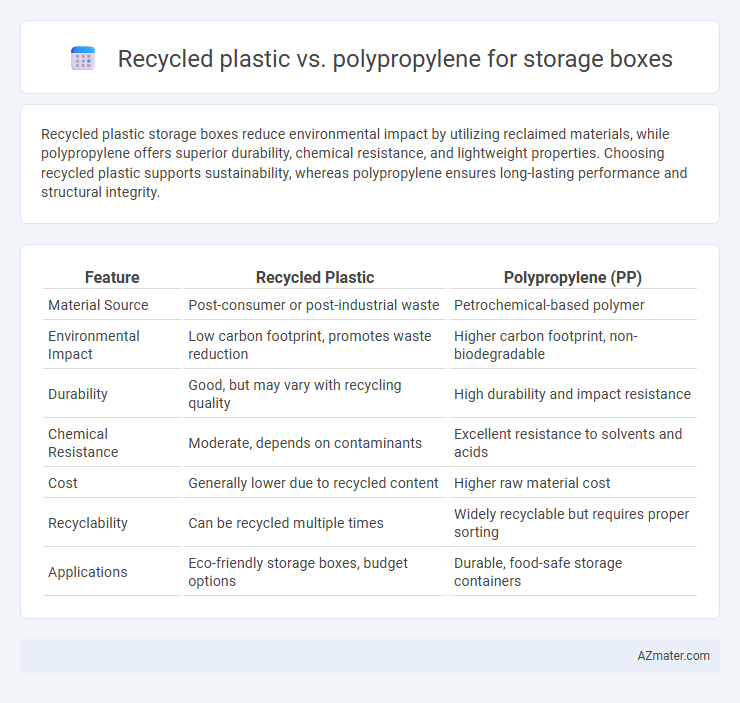Recycled plastic storage boxes reduce environmental impact by utilizing reclaimed materials, while polypropylene offers superior durability, chemical resistance, and lightweight properties. Choosing recycled plastic supports sustainability, whereas polypropylene ensures long-lasting performance and structural integrity.
Table of Comparison
| Feature | Recycled Plastic | Polypropylene (PP) |
|---|---|---|
| Material Source | Post-consumer or post-industrial waste | Petrochemical-based polymer |
| Environmental Impact | Low carbon footprint, promotes waste reduction | Higher carbon footprint, non-biodegradable |
| Durability | Good, but may vary with recycling quality | High durability and impact resistance |
| Chemical Resistance | Moderate, depends on contaminants | Excellent resistance to solvents and acids |
| Cost | Generally lower due to recycled content | Higher raw material cost |
| Recyclability | Can be recycled multiple times | Widely recyclable but requires proper sorting |
| Applications | Eco-friendly storage boxes, budget options | Durable, food-safe storage containers |
Introduction to Storage Box Materials
Storage box materials primarily include recycled plastic and polypropylene, each offering distinct advantages. Recycled plastic provides eco-friendly benefits by reducing waste and promoting sustainability, while polypropylene delivers high durability, chemical resistance, and lightweight properties. Choosing the right material depends on application needs such as environmental impact, strength, and cost efficiency in storage solutions.
What is Recycled Plastic?
Recycled plastic is material derived from reprocessing used plastic products, reducing waste and conserving natural resources. It is commonly made from post-consumer plastics like PET, HDPE, and polypropylene itself, contributing to environmental sustainability in manufacturing. Compared to virgin polypropylene, recycled plastic offers an eco-friendly alternative for storage boxes without compromising durability and functionality.
Understanding Polypropylene: Properties and Uses
Polypropylene is a thermoplastic polymer known for its high chemical resistance, durability, and lightweight properties, making it ideal for storage boxes that require robustness and longevity. Its resistance to moisture and impact ensures protection of stored items in various environments, while its ease of molding supports diverse storage box designs. This versatility, combined with its recyclability, positions polypropylene as a preferred material for eco-friendly and practical storage solutions.
Environmental Impact: Recycled Plastic vs Polypropylene
Recycled plastic storage boxes significantly reduce environmental impact by lowering the demand for virgin plastic production and minimizing landfill waste. Polypropylene, while durable and recyclable in theory, often contributes to plastic pollution due to lower recycling rates and extended degradation times. Choosing recycled plastic materials promotes a circular economy and decreases carbon emissions associated with raw material extraction and manufacturing.
Durability and Strength Comparison
Recycled plastic storage boxes offer variable durability due to the mixed quality of raw materials, often resulting in lower tensile strength compared to polypropylene counterparts. Polypropylene storage boxes provide superior impact resistance and consistent structural integrity, making them ideal for heavy-duty use and long-term storage. The inherently higher crystallinity of polypropylene enhances its toughness and resistance to cracking under stress, outperforming most recycled plastic composites in durability.
Safety and Chemical Resistance
Recycled plastic storage boxes often contain a blend of polymers, possibly affecting chemical resistance and introducing variable safety concerns related to residual contaminants. Polypropylene (PP) storage boxes provide excellent chemical resistance to acids, bases, and solvents, making them a safer choice for storing chemicals or food products. The consistent composition of polypropylene ensures it is non-toxic and food-safe, meeting stringent regulatory standards such as FDA approval for direct food contact.
Cost Efficiency and Market Availability
Recycled plastic storage boxes typically offer greater cost efficiency due to the lower raw material expenses and reduced manufacturing energy requirements compared to virgin polypropylene. Market availability of recycled plastic options is increasing as sustainability trends drive demand, but polypropylene remains more widely available and standardized for storage solutions. Businesses seeking affordable, eco-friendly storage solutions often balance the slightly higher initial cost of polypropylene with its durability and consistent supply.
Aesthetic Options and Customization
Recycled plastic storage boxes offer varied aesthetic options with customizable colors and textures derived from eco-friendly materials, appealing to environmentally conscious consumers. Polypropylene storage boxes provide a sleek, smooth finish with a wide range of vibrant colors and design flexibility, enabling extensive customization for branding and functional features like locking lids or transparent panels. Both materials support tailored designs, but recycled plastic emphasizes sustainability-themed aesthetics while polypropylene excels in precise molding and surface detail.
Suitability for Different Storage Needs
Recycled plastic storage boxes offer excellent environmental benefits and are ideal for lightweight, non-perishable items, making them suitable for eco-conscious consumers and casual storage needs. Polypropylene storage boxes provide superior durability, chemical resistance, and impact strength, making them the optimal choice for heavy-duty storage, industrial use, and items requiring long-term protection. Choosing between recycled plastic and polypropylene depends on balancing sustainability priorities with the need for strength and resilience in various storage applications.
Conclusion: Choosing the Right Material for Storage Boxes
Recycled plastic storage boxes offer an eco-friendly alternative with strong environmental benefits by reducing waste and lowering carbon footprints, yet polypropylene boxes excel in durability, chemical resistance, and cost-effectiveness. Selecting the right material depends on priorities such as sustainability goals, budget constraints, and intended usage conditions. For long-term storage requiring robust impact resistance, polypropylene remains a top choice, while recycled plastic suits environmentally conscious consumers seeking to minimize plastic pollution.

Infographic: Recycled plastic vs Polypropylene for Storage box
 azmater.com
azmater.com